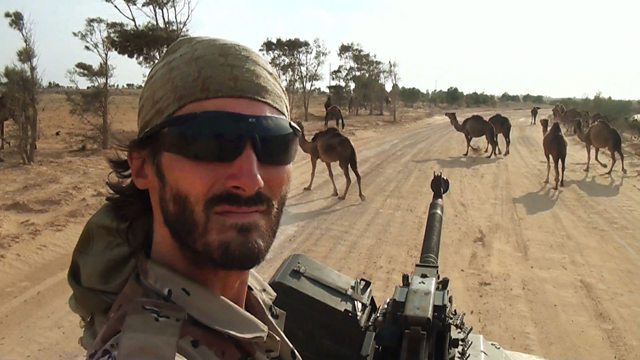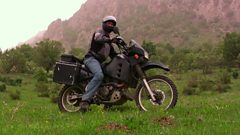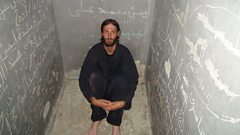
The Arabian Motorcycle Adventures
A Storyville documentary: an American's multi-year, 35,000-mile trip through northern Africa and the Middle East, which saw him fight in the Libyan conflict against Gaddafi.
Documentary which tells the remarkable story of Matt Van Dyke, a timid 26-year-old with Obsessive Compulsive Disorder, who left home in Baltimore in 2006 and set off on a self-described 'crash course in manhood'. He bought a motorcycle and a video camera and began a multi-year, 35,000-mile motorcycle trip through northern Africa and the Middle East.
While travelling, he struck up an unlikely friendship with a Libyan hippie, and when revolution broke out in Libya, Matt joined his friend in the fight against dictator Muammar Gaddafi. With a gun in one hand and a camera in the other, Matt fought in - and filmed - the war until he was captured by Gaddafi forces and held in solitary confinement for six months.
Two-time Oscar-nominated documentary filmmaker Marshall Curry tells this harrowing and sometimes humorous story of a young man's search for political revolution and personal transformation.
Last on
More episodes
Previous
Clip
-
![]()
How to film your own motorcycle adventure
Duration: 02:49
Marshall Curry, director of The Arabian Motorcycle Adventures, answers the Storyville Q&A

Hmmm, thatβs a little like asking which is more important - my left leg or my right leg.
What made you first want to explore the subject?
I got an email out of the blue from Matt VanDyke, a young American who told me he had gone on a 35,000 mile motorcycle journey through Northern Africa and the Middle East which had culminated with him joining the rebels in Libya fighting Gaddafi. He said he had footage of the adventure and thought it would make an interesting documentary, and after I spent a few hours with him, I agreed.Β It was a dramatic exciting story but also a fascinating exploration of the way we become adults, the way we define βmanhoodβ, and the way we use cameras to capture and craft our self-images.
How long did it take to get the film off the ground?
When Matt VanDyke first contacted me I told him that I only worked on documentaries where I had complete creative control and independence. Once he agreed to that I began preparations and a month or two later did the interview that makes up the spine of the movie. I was editing while I was raising money, and in all it took about two years to shoot, fund raise, and edit the film.
What were you most surprised to learn in the course of production? Β
This film is chock-full of drama and surprises, so itβs hard to pick a single moment that surprised me most. One of the biggest challenges was boiling down all of those moments and structuring them into a single coherent movie. In one section, for example, I had to take around 40 hours of footage that included mortar fire in Afghanistan, a police officer punching out my main character, a mob rioting in Iraq, and a wild dog attack - each of which could have been the climax of a normal documentary - and compress it into a 60 second music montage.
What have been the differences in reception to the film in countries it has now travelled to?
People seem universally to find the film provocative and entertaining. It has been interesting to see how differently audiences see the main character. Some people see him as a reckless thrill-seeker, while others see him as noble and selfless. It has been amazing that people could see the same person in the same movie and react with such strong - diametrically opposed - feelings.
Which documentary has most inspired you?
The film that inspired me most to make documentaries is probably Shermanβs March.Β The one that inspired me most as a person is probably The Times of Harvey Milk.
Favourite Website/blog?
Theonion.com
Who is the person youβd most like to interview, living or dead?
Martin Luther King Jr. He has been turned into a sort of mushy Santa Claus character, but was actually much tougher, smarter, and more complex than that.
Best piece of filmmaking advice youβve ever been given?
The best way to learn to shoot is to get a camera and go out and shoot. The best way to learn to edit is to sit in a room by yourself for months and months and try to edit something.
Best piece of filmmaking equipment you canβt live without?
I would have said Final Cut Pro editing software, but Apple seems to be phasing that out as a professional product so Iβm afraid Iβm going to have to learn to live without it soon. So Iβll say small wireless lavalier microphones. They enable you to step back from the people you are filming and let them be more comfortable and genuine.
If money was no object, what is your dream documentary subject?
Iβd love to make a real behind-the-scenes film about the Rolling Stones - a sort of follow up to Gimme Shelter.
Favourite film of all time?
Pulp Fiction.
Best recent read?
I just re-read The Great Gatsby last week and was reminded of how timeless those characters are.
Credits
| Role | Contributor |
|---|---|
| Director | Marshall Curry |
| Series Editor | Nick Fraser |
Broadcasts
- Mon 26 Jan 2015 22:00
- Fri 13 Oct 2017 01:00


